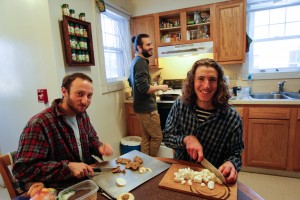Lubeck ’14 Co-Organizes Wesleyan Co-op to Provide Local, Sustainable Food

In this issue of The Wesleyan Connection, we speak with Jon Lubeck ’14 from the Class of 2014.
Q: Jon, what are you majoring in and what attracted you to Wesleyan?
A: I am majoring in anthropology and am currently in the process of writing my senior thesis. Wesleyan first piqued my interest when I had a class in high school with a super-inspiring history teacher who was a Wes graduate. When I visited the school, I loved the small, liberal arts atmosphere, the active arts and music scene on campus, and the history of active student organizing. Wesleyan seemed like a place to me where students were passionate about things that mattered to them, whether it was art, academics, music, political activism, food, etc. I wanted to be surrounded by passionate, excited people, and am so happy that I have the chance to be now!

Q: You’re currently a member and co-founder of Wesleyan’s Local Food Co-op Organization that provides an affordable option for students to purchase local and sustainable food. Tell us more about the group and why you got started?
A: The Wesleyan Local Food Co-op has a long history behind it. It was started during my sophomore year by Cathryn Herlihey ’12, who was unsatisfied with the meal plan options offered by Bon Appetit. She felt like there was no option for her to purchase locally grown and ethically raised products (since then, Bon Appetit has begun to offer some great options at Usdan and Weshop). The Co-op started with around 20 members who were friends of hers and allowed to join this pilot program. Soon after, we started actively organizing it ourselves, buying more kinds of foods, and quickly expanded. We now have nearly 600 members, including faculty and staff for the first time this semester. We have plans next year to expand to Middletown residents and offer subsidized shares to participants on various forms of food aid: SNAP and EBT benefits and the Woman Infants and Children program. We are in the process of applying for grants and positions to administrate this new incarnation.
Along with Will Curran-Groome ’14 and Scott Zimmer ’14, I am in charge of organizing and administrating the Co-op. We all became involved very early on in the Co-op’s history, and really found the work we did fulfilling. As a student-led and administered group, we strive to incorporate as many members as possible in the decision-making and administration (this is one of the ways we can cut down on costs). For example, every member signed on is obligated to help oversee and handle distribution once a semester, for an hour and a half.
Q: What types of food are available, and where does it come from?

A: We are offering 11 shares this semester. The produce – eggs and meat (pork, beef, chicken and fish) – are all sourced locally from various farms throughout Connecticut and southern Massachusetts. The dairy (butter, cheeses, yogurts, and ice creams) and milk come from Ronnybrook Dairy Farm in upstate New York. We offer a bread share where students choose and receive a fresh baked loaf of bread weekly from a baker in Rocky Hill. Starting this semester, we are sourcing coffee from Zen Roasters in Middletown and granola from a baker in New York. We deliver weekly tofu and seitan (a vegetarian meat substitute made from wheat gluten) shares produced by The Bridge in Middletown as well. Lastly, a chef in the Bon Appetit kitchens has a side-business making various types of preserves, including jams and jellies, applesauces, vinegars and pickles.
Q: What does it cost to join the co-op, and how often do students pick up their food items?
A: Prices vary based on the shares purchased. Generally, most of our shares are distributed every week. For example, the cost of a produce share is around $115. As part of the produce share, students receive a weekly assortment of seasonal vegetables. We always try to source a diversity of crops and interesting varieties. A typical share each week includes a few onions, a few root vegetables (turnips, potatoes, sweet potatoes, carrots, etc), a few apples, some type of braising greens, and even some mushrooms. Students can buy any number and types of shares as they want, and split the costs of a share with their roommates or friends if they like.
Q: Are foods offered year-round?
A: The Co-op runs during both semesters, and generally, all our shares are available throughout. As a Co-op that sources local food, there is a limit to what we can provide in terms of produce, New England weather permitting.
Q: The Food Co-op also recently started allowing faculty and staff to take part. Is that option still available? How does one join the co-op?
A: Unfortunately, signups are closed now. If you are interested in signing up next year, we post signup forms on Wesleying.org at the beginning of each semester.
Q: Are you involved in other Wesleyan organizations or clubs?
A: I am involved with Wesleyan’s on-campus farm Long Lane. I have worked on the farm over the past three years, and like the other students in the collective, have been involved in every stage of the farming process: planning, planting, and harvesting our crops for the dining hall and the Middletown Farmer’s Market. I am involved with WesESL, tutoring English to custodial stuff on-campus.I brew beer and other fermentables with the Wesleyan Brewer’s alliance. I love rock climbing and have begun to compete competitively(in the most non-competitive manner) in climbing through Wesleyan’s club team WesClimb. For awhile, I was also involved with WesFresh(Wesleyan Students for Real, Ethical, Sustainable, Habits), a group dedicated to advocating for issues around environmental and food policy. I have a lot of interests and participate in lots of random extracurriculars: the list could go on and on..
Q: You’ll be graduating this May. What are your post Wesleyan plans?
A: I’m not absolutely certain. I’m interested in a lot of food and food-policy related jobs: apprenticing on farms, managing farms, working in farm education, working for a retail, larger food Co-op (like Wesleyan’s), urban farming initiatives, etc. After having spent time living and traveling in Mexico and other parts of Latin America, I am also very interested in working abroad for a time. I would love to teach English as a foreign language, or even work through the PeaceCorps. If food and food-policy does not seem my thing, I would love to teach ESL, social sciences, or English in a high school or middle school in the States.

